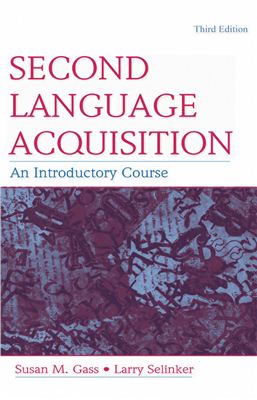Pages: 612
Publisher: Routledge; 3 edition (2008)
Quality: good: pdf
The new and updated edition of this bestselling introductory textbook is a comprehensive overview of the field of second language acquisition. In an easy-to-read, accessible style, it provides students with information about the scope of the field, but also provides background information on related areas such as first language acquisition. The book introduces students to current issues of data collection and data analysis, as well as provides an historical overview of the field, thus giving students context and perspective about how today's issues arise from earlier approaches.
Each chapter offers discussion questions and/or problems so that students can put their knowledge to use in a way that is relevant to what they have leaed, but that also challenges them to go beyond what is in the chapter and to relate information across chapters.
The book covers a range of areas of second language research including sociolinguistic, psycholinguistic, and linguistic perspectives. It also includes a chapter on the lexicon and on instructed second language leaing. The concluding chapter pulls the information in the previous chapters together into a coherent framework that challenges students to think about the field of second language acquisition as a whole.
ISBN 0-203-93284-6 Master e-book ISBN
ISBN10: 0–805–85497–5 (hbk)
ISBN10: 0–805–85498–3 (pbk)
ISBN10: 0–203–93284–6 (ebk)
ISBN13: 978–0–805–85497–8 (hbk)
ISBN13: 978–0–805–85498–5 (pbk)
ISBN13: 978–0–203–93284–1 (ebk)
Publisher: Routledge; 3 edition (2008)
Quality: good: pdf
The new and updated edition of this bestselling introductory textbook is a comprehensive overview of the field of second language acquisition. In an easy-to-read, accessible style, it provides students with information about the scope of the field, but also provides background information on related areas such as first language acquisition. The book introduces students to current issues of data collection and data analysis, as well as provides an historical overview of the field, thus giving students context and perspective about how today's issues arise from earlier approaches.
Each chapter offers discussion questions and/or problems so that students can put their knowledge to use in a way that is relevant to what they have leaed, but that also challenges them to go beyond what is in the chapter and to relate information across chapters.
The book covers a range of areas of second language research including sociolinguistic, psycholinguistic, and linguistic perspectives. It also includes a chapter on the lexicon and on instructed second language leaing. The concluding chapter pulls the information in the previous chapters together into a coherent framework that challenges students to think about the field of second language acquisition as a whole.
ISBN 0-203-93284-6 Master e-book ISBN
ISBN10: 0–805–85497–5 (hbk)
ISBN10: 0–805–85498–3 (pbk)
ISBN10: 0–203–93284–6 (ebk)
ISBN13: 978–0–805–85497–8 (hbk)
ISBN13: 978–0–805–85498–5 (pbk)
ISBN13: 978–0–203–93284–1 (ebk)

